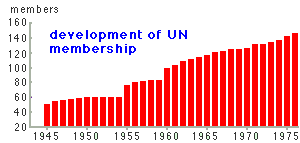
International organization of the sovereign states of the world, established 24 October 1945.
The United Nations were founded in the last days of World War II; they represent the second attempt after the League of Nations to provide a world body that can prevent a repeat of worldwide military conflict. The initial discussions involved Great Britain, the USA, the USSR and China. The final charter evolved at the foundation conference in late 1944 and came into force on 24 October 1945, when it was ratified by more than 50 states.
The aims of the United Nations, laid out in its Charter, are
The structure of the United Nations follows the model of the League of Nations. Its major organs are
Among the many subsidiary bodies and specialized agencies are
When the four major powers initiated the establishment of the United Nations their aim was to stabilize the status quo established through World War II, which was characterized by the confrontation between two superpowers (the USA and the USSR) and their allies. The UN mechanisms helped maintain peace in the face of possible mutual destruction. Its economic institutions (World Bank, IMF and GATT) were, however, dominated by the USA and its capitalist allies, while the USSR and China remained excluded. This made the United Nations a useful instrument for the USA and guaranteed its active support for the UN system.
The admission of many new member states as a result of the de-colonization process changed the character of the UN. The developing states organized their own block in the General Assembly, the "Group of 77". (The group's membership grew eventually to 127.) Encouraged by OPEC's success in gaining control over the oil price in 1973, the Group of 77 demanded greater participiation in UN agencies and institutions. A significant result of this period was a new Law of the Sea that gave control over the resources on and below the continental shelf to the coastal states.
Faced with an increasingly independent UN and a generally hostile attitude to superpower domination, the USA began to withdraw support from certain UN activities and on several occasions withheld its membership dues for long periods. The break-up of the USSR in 1991 brought the end of one superpower, and the USA began to regard the UN as a hindrance to its plans for world domination. In 2003 it started a war against Iraq in open defiance of the Security Council, causing some commentators to predict the end of the United Nations.
In the globally connected world of the 21st century there will always be a need for an international political authority, and the UN will continue to play an important role. It can only function successfully in a world where political power is reasonably balanced between two or more centres. A superpower that can act against world opinion with impunity will always feel the temptation to ignore international law and follow its own interests.
